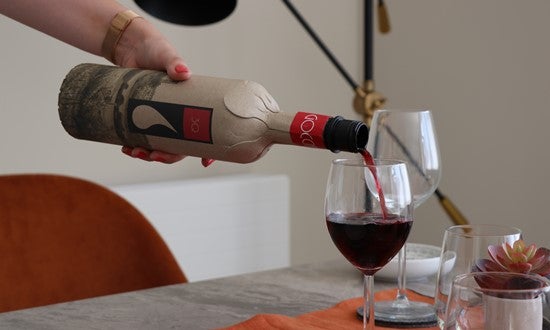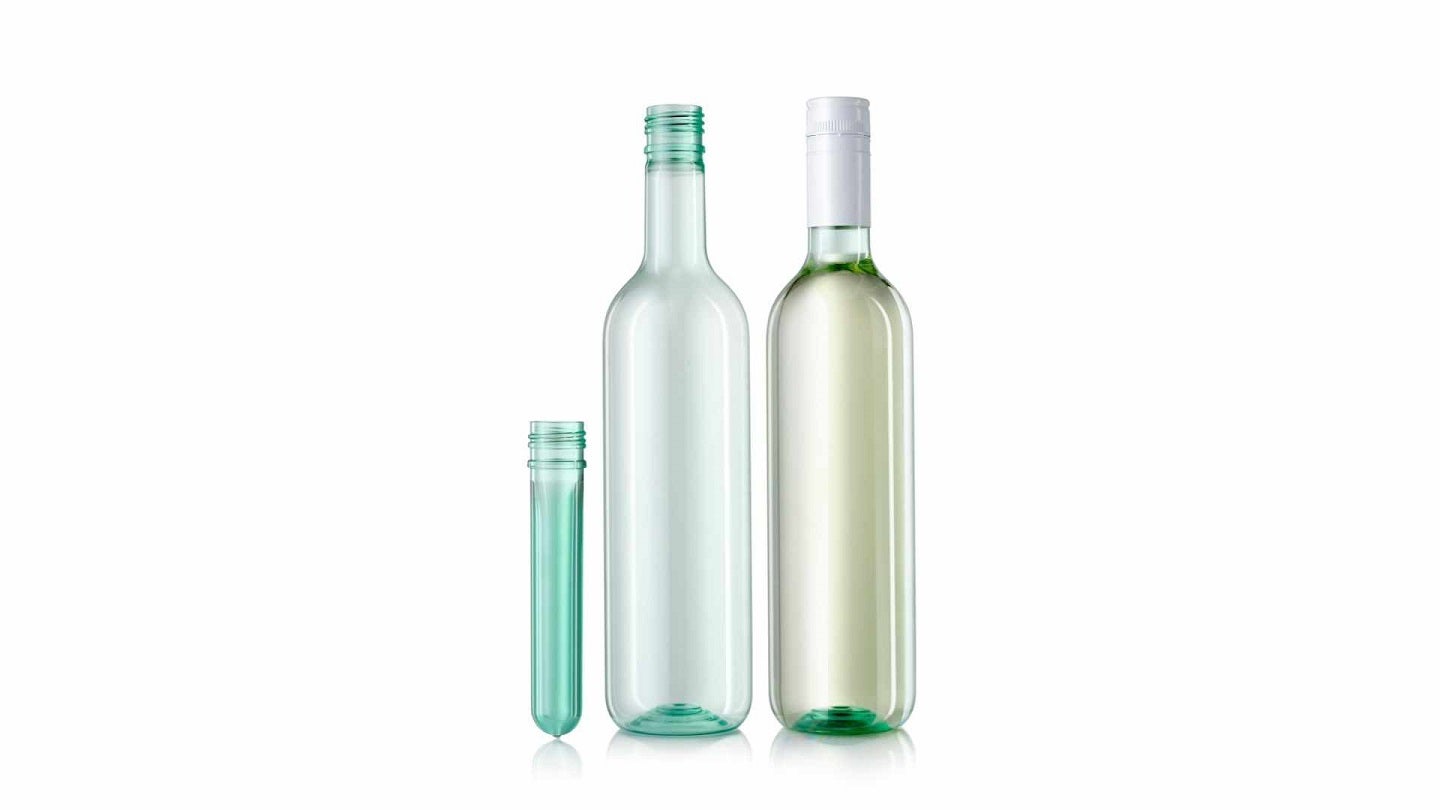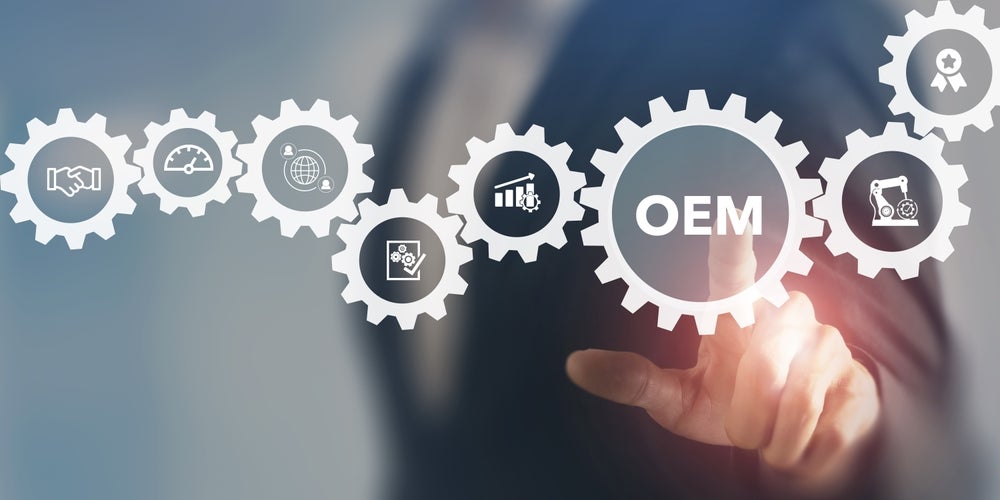
Packaging DECODED
Previous edition: 09 May 2024
Share article
Get the full version straight to your inbox.
Exclusive access to our best-in-class data & intelligence
Subscribe now
Frugalpac wins King's Award for Enterprise with eco-friendly paper bottles
Packaging Gateway looks into the environmental impact of paper and glass in bottle packaging, following the launch of Frugalpac's new paper-based wine bottle 'Frugal Bottle'.

Today, UK-based sustainable packaging company Frugalpac announced the launch of Frugal Bottle, a recyclable wine bottle made from 94% recycled paperboard.
A statement released by the company said that the 75cl ‘Frugal Bottle’ is made from 94% recycled paperboard and a food-grade liner to hold the spirit. The statement also said that the Frugal Bottle can be refrigerated, is comparable to the cost of a labelled glass bottle, and can be easily re-recycled.
The bottle will be used to package Italian vineyard Cantina Goccia’s red wine ‘3Q’, described as an “unwooded Sangiovese red with a hint of Merlot and Cabernet Sauvignon.”
Response to the launch
Frugalpac chief executive Malcom Waugh said: “Our mission is to design, develop and supply sustainable packaging. The Frugal Bottle is up to five times lighter than a glass bottle, has a carbon footprint up to six times lower and is easy to recycle again.
“We’ve had fantastic feedback from people who’ve trialled the Frugal Bottle. As well as the superior environmental benefits, it looks and feels like no other bottle you have ever seen. We want to deliver great wine and spirits in innovative packaging whilst helping our customers and consumers reduce their impact on the environment.”
Cantina Goccia owner Ceri Parke said: “We’re delighted to be making history with the most sustainable wine bottle in the world. For us, the Frugal Bottle is about achieving a considerably more sustainable form of packaging for an industry crying out for innovation. It will help us decarbonise the drinks industry.
“When some of our top hotel customers saw samples of our paper wine bottle, there was no hesitation in their minds that this type of bottle would be well received in their dining rooms. The launch of the Frugal Bottle is a big leap in sustainability without compromising wine quality.
“It’s much lighter than glass, easier to transport and friendlier to the planet. Just as important, our wine still tastes as wonderful in a paper bottle as it does in glass.”
The advantages and disadvantages of a paper bottle
According to Frugalpac, the Frugal Bottle is lighter than a glass bottle, better for the environment, has a carbon footprint up to 84% lower than a glass bottle, is easy to recycle, and uses less plastic than a plastic bottle.
In being lighter, a paper bottle is easier to carry and lighter to transport, which means pollution caused by transportation is lower when compared with glass.
In addition to this, the Frugal Bottle is made from recycled paperboard. Paperboard is ecologically beneficial as, in general, the paper recycling process releases 70% less carbon dioxide into the atmosphere than wood pulp, also, materials used to make paper can be sourced from sustainably managed forests and paperboard in particular is readily recyclable and compostable, making it biodegradable.
However, fibres that are used in paper material can not be endlessly recycled according to US-based packaging company World Centric. The company on its blog noted that any material derived from trees is ecologically damaging and that every time recycled paper is reused it is chemically treated in order to remove inks and impurities. This means that the material loses strength after five to seven times in recycling and ends up in landfill.
The advantages and disadvantages of a glass bottle
Like paper, glass is fully recyclable. It can also be endlessly reprocessed with no loss of quality, according to England’s national recycling campaign RecycleNow. Glass is also a highly recycled material, with an average recycling rate of up to 80%, according to Glass Alliance Europe, while paper recycling rate is at 66.2%, according to Recycling Today.
However, due to the heaviness of the material, transport emissions are high and glass can only be recycled in furnaces which use high energy in order to reach high heat, thus emitting pollution. Furthermore, glass is made from sand, soda ash, limestone, and other additives. These materials needed to produce glass have to be quarried, which is a process that creates visual pollution and destroys wildlife habitats.
Latest news

ALPLA launches new recyclable PET wine bottle
ALPLA, a company specialising in plastic packaging, has announced the launch of a new recyclable wine bottle made from polyethylene terephthalate (PET).

How packaging OEMs are winning talent wars
Exploring how OEMs are developing innovative strategies to attract and retain skilled technicians for top equipment performance and customer satisfaction.

CNG gains ISCC certification at Bloomer, Wisconsin site
BASF announced today that it has received the International Sustainability and Carbon Certification (ISCC) PLUS for certain grades of plastic additives produced at its manufacturing sites in Kaisten, Switzerland and McIntosh, Alabama, United States.

DS Smith invests in new machinery at La Chevrolière facility
UK-based packaging firm DS Smith is set to invest in new machinery at its facility in Louth, East Lindsey district of Lincolnshire, England.

Ardagh signs PPA with Sunnic Lighthouse for renewable energy
Ardagh Glass Packaging-Europe (AGP-Europe), an operating business of Ardagh Group, announced today that it has entered a renewable electricity Power Purchase Agreement (PPA) with Sunnic Lighthouse GmbH and parent company, ENERPARC AG, in Germany.

SgMA scales up plastic-free packaging production with new funding
Cambridge-based Xampla has announced the appointment of its new CEO to scale-up the business. Alexandra French, an experienced chemist with a degree in Natural Sciences from the University of Cambridge, has joined Xampla to lead it through the next phase o...

Lunchskins introduces new recyclable Lunch SAC lineat Target stores
Lunchskins has launched Lunch SACS, aimed at providing customers a sustainable option with elevated design.

In-line seal inspection for better food packaging quality
In early August, Shenglong Inspection, a subsidiary of Hilong Group, won the fourth segment of PetroChina’s Qingtie (Daqing-Tieling) No. 3 pipelines and other three pipeline in-line inspection projects including the of PetroChina Pipeline Branch – Φ508 mm Cangzi (Cangzhou-Zibo) pipeline in-line inspection project. The winning of the bid signifies a vital breakthrough by Shenglong Inspection in the pipeline internal inspection market.
In our previous edition

Packaging Decoded
Tide Rock acquires US company Premier Packaging
08 May 2024

Packaging Decoded
Beyond the box with Blue Lake Packaging founder Ying Liu
07 May 2024

Packaging Decoded
Palouse Fiber Packaging unveils wheat-based solution
06 May 2024
Newsletters in other sectors
Aerospace, Defence & Security
Banking & Payments
Medical Devices
Travel and Tourism
Search companies, themes, reports, as well as actionable data & insights spanning 22 global industries
Access more premium companies when you subscribe to Explorer


